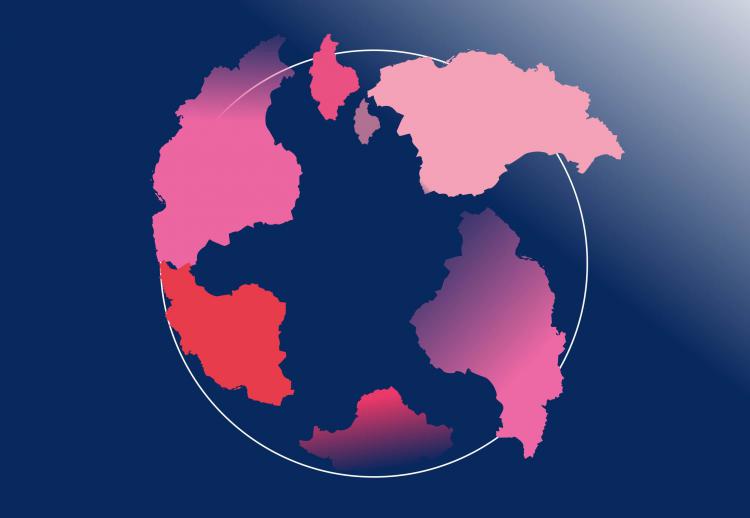Here lives Iran
Exile-Iranians living in European cities participate in the Smockadoll literature festival that takes place 24-25 October in Malmö: Two packed days of readings, discussions, short film and music videos. It is a unique opportunity to meet some of the most prominent exile Iranians in Europe - Iranian writers now inhabiting Sweden, Czech Republic, Germany, France, and what not. Readings and conversations will be held in Swedish, English and Farsi. Several of the writers are ICORN guest writers.
PROGRAMME
Thursday 24 October at 19.30
SPRÅKA eavesdropping on modern Iran Readings of new literature - original and translated
Victoriateatern, Malmö (Doors open at 19.00)
(Tickets: http://victoria.se/, Kulturcentralen. 60 Skr)
See the Live stream of Here lives Iran at the Victoriateatern tonight.
Friday 25 October at 16:00
Here lives Iran (In Farsi)
Readings and mini seminars in Persian.
Iransk Svenska Föreningen, Ystadvägen 44, Malmö, free entrance.
Friday 25 October at19:30
Here lives Iran (English and Swedish)
Mini seminars and discussions on writing in exile.
Poeten på hörnet, Södra Förstadsgatan 65, free entrance
PARTICIPANTS
Ehsan Abedi (1981) from Teheran is an author and a poet. He has worked as a journalist since the 1990’ies and got his university degree in social science. Abedi has been subjected to censorship and harassment during his entire journalistic career. Several newspapers that he worked for have been shut down by the Iranian authorities during the 2000s. He was an ICORN guest writer in Italy 2011-2013 and now lives in Prague.
Nooshabeh Amiri (1952) is a writer, journalist and political activist. She began her carreer as a journalist in Teheran in 1971. She worked with dubbing children’s movies and for some time she was the head of the State’s dubbing section for film and television. Amiri has written film reviews and worked as editor of a film periodical that was closed down by the authorities. Since 2003 she has lived in exile in France where she has continued to write about politics, social issues and gender. During the 80’es, her husband Houshang Asadi was a political prisoner. Their exchange of letters during this period has been published in Persian and later into French. It will be published in English in 2013 with the title “Six lines from prison” (Dracopis Press).
Shabnam Azar (1977) is a poet and journalist. She published her first poems when she was 17. Her debut poetry collection was published in 2005 and won several national prizes. During the 2000s she was an active cultural journalist for several newspapers and magazines. Since she went into exile in 2009, she has published her third poetry collection in Paris, where she became editor for the poetry department at the publishing house, Nakoja. Azar now lives in Germany.
Naeimeh Doostdar was born in Teheran in 1977. She is a journalist and writer and since 2012 an ICORN guest writer in Malmö. She already started working as a journalist during high school and received several national honours in Iran. Doostdar also wrote poems and short stories that were published in books. In 2009 the political climate worsened in Iran and Doostdar was imprisoned because of her blog and other journalistic writings. In Sweden she continues her journalistic work through the web media and radio with focus on women’s situation and political issues. Her first collection of works translated into Swedish, ”Så småningom gick jag inte hem" (Smockadoll förlag), was published in 2013 and includes poetry and short stories that have been banned from publishing in Iran.
Azita Ghareman (1962) is a poet and translator. She debuted as a poet in 1990 and had already published four high-profile poetry collections before arriving in Sweden in 2006. Her poetry is translated into Swedish. “Serendips loggbok” is one of her books written after leaving Iran. She has translated Tomas Tranströmer into Persian.
Mehrdad Ghasemfar (1965) is a writer and journalist and started publishing poetry in periodicals in Iran. In 2000 he published his first poetry collection and got the attention of renowned poets and critics. Since 1995 he worked as a critic and cultural editor of magazines. He left Iran in 2008 after being charged with five years of prison. With him on his travel he had three poetry collections for which he had not been granted permission to publish in Iran. He now lives in the Czech Republic and works for the Persian Radio Farda.
Mohammad Ghaznavian (1982) is a writer and activist. He became socially engaged in his early years and in 2000 he started a non-governmental organization in Ghazvin only to be shut down by the government in 2005. He continued his work through the Union for defense of street children and child labour. He was forced to leave Iran in 2010 and has continued working for children’s rights, has collaborated with among others the “one million signature campaign”, anonymous drug addicts and various trade unions. In periodicals and Persian internet media he debates the social shortcomings of Iran. He is now seeking asylum in Sweden.
Reza Haji Hosseini (1980) works as a journalist and writer on the topics of theatre and human rights. He has written analyses and critiques and has contributed to several theatre festivals in Teheran. His university degree in theatre studies was cut off at master level because he investigated the relationship between theatre and politics. He has worked at the Iranian cultural radio channel Farhang, as chief editor and producer, and has won prizes for his own programmes. Before Reza was forced to flee Iran, he was the chief editor of a local journal in Teheran and had been active as a freelance journalist for seven years for larger periodicals like Jame Jam and Hamshahri. Since he left Iran, Hosseini has written about culture and social politics and especially on human rights. In 2011, from abroad, he started working with web publications, exile radio and podcast distributors. He lives in Sweden.
Anahita Hosseini was born in 1986 in Zanjan. She has a degree in law from the University of Teheran and an additional master in Russian studies. She was politically active during her time at university, as chief editor at a student journal and as board member of the student board. She and other student activists were arrested and put in the Evin prison in 2007. During trial, she took the opportunity to leave Iran and was, in her absence, condemned to prison for her political activity. She started writing short stories during university, but began her career as an author in exile. In 2012 she published “Dimma och svarta tulpaner» through the Iranian exile publishing house Gardoun in Berlin. Her short stories have since spread throughout Iran via internet periodicals. She lives in Sweden and is currently studying for a master in Middle Eastern studies.
Sepideh Jodeyri was born in 1976 in Ahvaz. She has written poetry and short stories since she was seven and has been an author since 1997. She debuted in 2000 with the poetry collection ”Drömmen om den amfibiska flickan” followed by the short story collection “Logiskt” in 2001. She has translated a poetry collection by Edgar Allan Poe and Jorge Luis Borges into Persian. Jodeyri was an ICORN guest writer in Italy 2011-2013 and now lives in Prague.
Fahimeh Khezr Heidari (1978) is a journalist and a poet. She has studied Persian language and literature at the University of Teheran. Through an administrative job at the periodical Salam, she got involved in journalism, and has since been a journalist at the periodical Zanan (prohibited in 2008) and several newspapers, like Farhang-e Ashti and Etemad-e Melli. She left Iran in 2010 and works as a journalist at the Persian Radio Farda in the Czech Republic.
Nasrin Madani (1979) is a writer, critic and editor. She got her master’s degree in Persian literature at the University of Teheran and has written a large number of articles and reviews on poetry. She wrote her first novel when she was 18, and has received numerous awards for her short stories, among others, the Sadegh Hedayat prize in 2007. Her two latest short story collections were forbidden published by the Iranian authorities. She is the first ICORN guest writer in Växjö, 2012-2014. In 2014 Smockadoll will publish her ”Jag har passerat torra årstider”, her first short story collection translated into Swedish.
Sohrab Rahimi (1962) has been living in Sweden since 1986 and debuted as a poet in 1995. He is a cultural journalist for Swedish and Persian media. The high profile prose book ”Krigsbibliotekarien” was published in 2011 by Smockadoll. It depicts the years of the Iran-Iraq war, which was his only way out of the country. His list of merits as translator of Persian and Swedish is comprehensive.
Shahab Sheikhi was born in 1976 in Saghez in Kurdistan. He has written poems and short stories in Kurdish since he was 18 and translated between Kurdish and Persian. Sheiki has a university degree in sociology and gender science and was forced into exile due to retaliations on his journalistic texts in both Kurdish and Persian media and because of his activism for human rights, women’s rights and social rights. He now lives in Germany.
Roya Zarrin was born in 1971 in Aligoodarz. She has published five poetry collections and two more that were banned from publishing by the Iranian authorities. She has been nominated for, and won, several national literary prizes, among them prestigious critics’ awards. Zarrin has translated French children’s books into Persian. She applied for asylum in Sweden in 2013.
& special guests.
The Smockadoll literature festival
The “Here lives Iran”-festival is curated by Naeimeh Doostdar, Reza Haji Hosseini, Thomas Jönsson, Kristian Carlsson and Smockadoll.
The “Here lives Iran”-festival is implemented by Smockadoll/Språka in cooperation with Victoriateatern, ABF Malmö, Iransk Svenska Föreningen, Mazettis Blandning, Dracopis Press, with support from Malmö stad, Kulturrådet, Svenska Akademien.
Writers
Latest news
-
23.04.24
-
18.04.24
-
04.04.24
-
26.03.24
-
21.03.24








